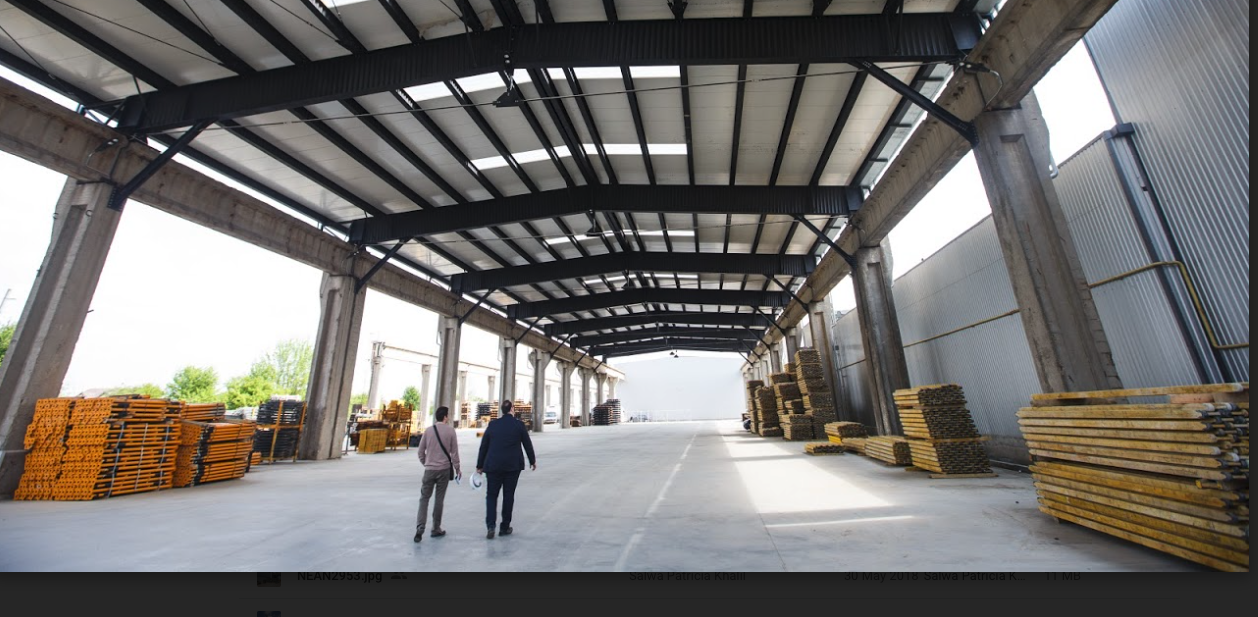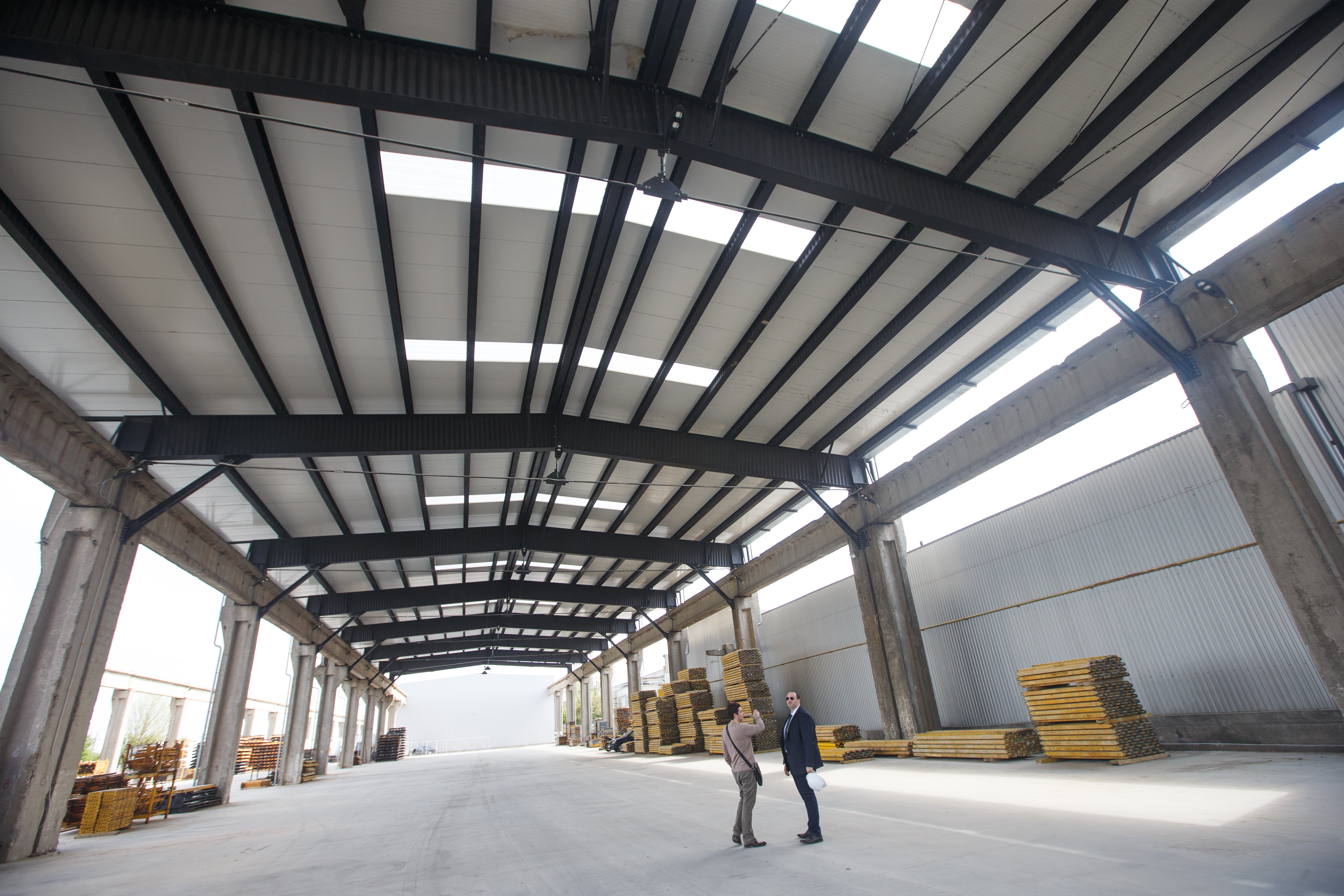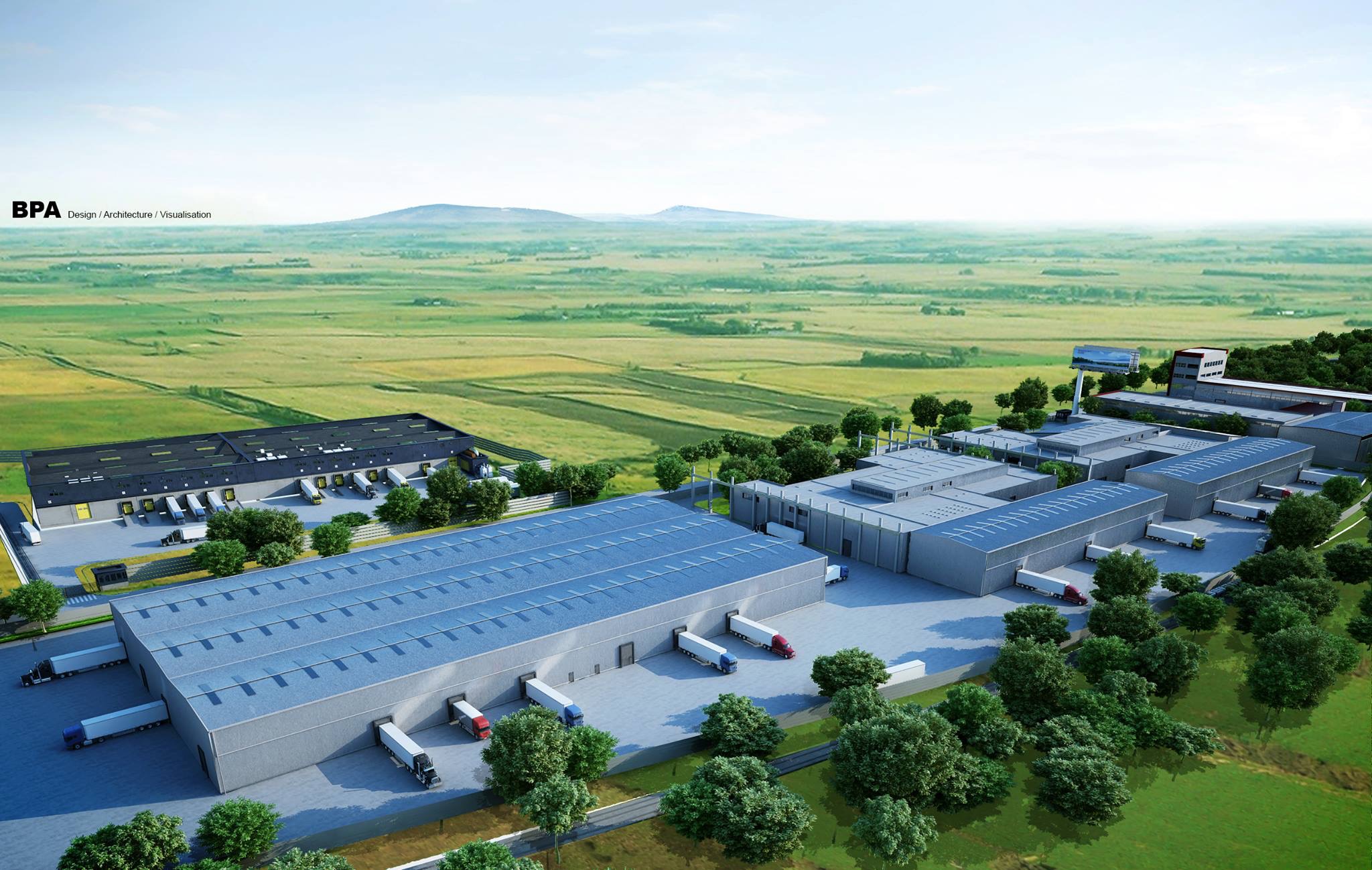WM:We would like to warmly welcome Nicholas N. Bouri today. Could you please briefly introduce yourself and tell us about your relationship with and connection to AISB?
NB:I am a Graduate of AISB’s class of 2002. I moved to Romania when my father privatized various state companies in the late 90’s. I have a lot of great memories at AISB. We were the first senior class to graduate from the new campus in Pipera. I had the pleasure of experiencing both the Dorobanti campus in the city center and the current campus in Pipera with all its modern facilities.
Today, I am the Managing Partner at N.G.B, which is our group’s real estate development arm in Eastern Europe and which has been based in Romania since 1995. The company’s main activity today is to develop and manage industrial real estate properties. Our properties are designed for Logistics, Distribution, IT&E-commerce and Production companies looking to lease our facilities for medium to long term periods.
WM:In your opinion, what is the value that an international education offers to students and what effect does it have on their development?
NB: An international education has many benefits for young students; It allows them to integrate with an international community from around the world, giving them early insight to different cultures at a young age.
In my experience, international schools always had a higher level curriculum, facilities and, most importantly, teachers and counselors as compared to local public schools. These amenities, coupled with the proper dedication and focus from the student could open doors for the students to some of the best universities around the world.
 WM:
WM: What about that of higher education? What is your experience?
Higher Education is very important in my opinion; there are some significant benefits to a higher education:
A) Personal development: critical thinking, realization of passions, sense of accomplishment and communication;
B) Pursuing a passion: University helps you identify your passions and interests and gives you access to the theory and practice to explore such passions. Otherwise, University helps you realize what you are not interested in which is equally important;
C) Getting a good job: earning a higher education degree increases your chances of landing a good first job, which may help set you on a promising path down the road. Universities typically have their own career platforms as well which can be very useful; and
D) Networking: the most important aspect of a higher education is networking, in my opinion. You never know who you will meet on campus, in the dorm room or at an event. Broadening your network could open doors for you down the line. Joining a club, a fraternity, or a team have long term benefits and lasting friendships.
In my personal experience, each year, I continue to study and complete courses or programs that I believe might help me in my professional and personal growth. To date, I hold a Bachelor of Science in Business Administration from Deree College (Greece). I hold a Graduate Degree from Cornell University in Financial Management. In 2014, I graduated from INSEAD’s MAP Program. I hold a Diploma in Project Management from IBMI. I am licensed as a real estate developer. As of September, I will be completing a degree in International Mineral Extractions from the University of Derby. My goal is to enroll in an EMBA within the next 3 to 5 years when my schedule allows for it.
WM: Please tell us about your family history and the generations that make up the Bouri family.
NB:I have a very diverse background. My father is Lebanese and my mother is American with Greek Heritage. I was born in NYC and spent most of most of my childhood growing up in Athens, Greece. I have 3 siblings and my mother-tongue is French.
Today the Bouri family is located across 4 continents; we are considerably a large family. I have five uncles and four aunts all from my father’s side of the family, forty-eight first cousins, most of whom we have close ties with, and many of us work together in some capacity or another. From a business perspective, we are now in our 4
thGeneration.
WM: Why Romania as a home and business hub?
NB: Romania is a great place to live and grow up. The country is very safe, full of history, culture and wonderful people, amazing restaurants, beautiful hotels, and lots of activities to partake in. The country has beautiful mountain sides, and at the same time the sea side just 2 hours away from the capital. Another aspect is that living in Romania is more affordable than living in most other EU countries.
As a business hub, we entered Romania when my father privatized various companies in the 1990’s. However, Romania is also strategically located. It is the gateway between Western Europe and Asia (via Turkey). The country has lots of natural resources, one of the largest surfaces in Europe for agriculture, a strong and growing industry for production for example the automobile industry, and it has a strong IT industry and culture. Setting up a company in Romania is a very welcoming and a simple process. Furthermore, taxes are some of the lowest in Europe, which is one of the main reasons we have seen so many foreign companies entering the market in the last decade and still, more are coming.
The main challenges Romania will need to face in the coming years is the development of its infrastructure and available workforce. Unemployment today in Romania is at the lowest level it’s been throughout the country which is now becoming a major topic in our industry for companies looking to enter the market.
Overall, Romania has a bright future with many opportunities in all industries when comparing to most other EU countries. I decided to join the team in Romania because I believed I could add value and develop our business in the region compared to staying in Greece or Lebanon. I saw the opportunities the country had to offer.
WM:Tell us about your family business, what industry do you operate in, in what countries are you present, how did the family business come about, and how did you manage to keep it in the family for so long?
NB:On the international level, our family is widely known for being in the Cement industry. However, Over the years, the company expanded from Cement trading and production to Shipping, Port Services, Land and Sea Terminals, Concrete Production, Aggregates Mining, Real Estate, Energy and other businesses. The group has offices and activities in 5 continents.
In Romania, we privatized various state companies which were mainly in the Concrete and Aggregates industry. In 2006, after having re-structured everything under one umbrella, we sold the main activity to Anglo-American. Since then, we were left with a lot of real estate, mainly industrial properties, from which N.G.B was born. Today N.G.B has investments in real estate, aggregate mining, concrete, and energy in Romania. N.G.B has investments in Greece and Serbia as well.
WM:What are some of the advantages of a family owned business?
NB:I would have to say, for me, the main advantage is trust. All members of the family in the company are working towards the same goal; to preserve our current position and secure a more prosperous future by continuous and strategic re-investments in our industries. In our case, I know the type of intense training and knowledge my siblings and I needed to obtain our current positions, so their advice and pointers are always respected and well received.
In our company, the decision making process is a quick one; unlike at large corporations, our team can decide and act at a faster speed which is advantageous in many cases. We also have a long-term outlook and commitment to the group which allows us to plan and organize well and accordingly.
 WM:
WM: How do you prepare for a family business to be taken on generation after generation so that the business continues? How do you excite the next generation about the prospect of taking over?
NB:With time and good preparation. The handover to the next generation should not be a quick and simple process, it should take years. The next generation should and needs to understand all the elements of the business before taking over.
In my case, I used to visit my father and his brothers at work in the office in Athens or at the shipyards in Turkey or the mines in Romania. From an early age, I can remember loving visiting him wherever he was, feeling a sense of pride and excitement when he would explain what he was “building”. What made it more special for us, was that we were always spending time together with my uncles, my cousins and other relatives. Our employees were viewed as distant but close family, always joining us at family weekend events or other special celebrations. The Family and the Business were very closely connected and it was embedded in our culture from a young age.
Regarding my preparation, similarly to my siblings, we started our training at a young age. I started my first real internship within the Group the summer of my junior year in high school, travelling across Romania to the quarries, mines, and concrete plants to learn the basics. Department by department, industry by industry – depending on where my passions and interests were. Each summer I would have a specific role/responsibility; most of which was to learn and listen.
At the end of 2003, I decided to return to Europe to finish my undergraduate degree, during which time, I worked three days a week, as an intern in our shipping company in Athens for a period of three years, in Accounting & Finance and Operations. In 2007 I returned to Romania, where I began working in the Commercial and Business Development department for N.G.B Ten years later, I am now the Managing Partner of N.G.B
WM:Is there a family constitution or procedure for dispute resolution that you implement so that the interests of the family are aligned towards the family business? What if someone has a different passion or wants to make a change?
NB: We do have a constitution which states our roles, responsibilities and more, yes! And we expand it, year by year, as the family is growing and the family business is expanding. Establishing such a constitution is very useful and avoids any type of misunderstandings or confusion.
We are very lucky because our father, though he would like to see us all together, has always been supportive for us to explore our passions and other business opportunities if that is what we want. Fortunately for us, we are all together today.
In regard to my experience and passions, I have invested in other ventures that are not oriented towards our family business. I am a Founding partner and majority shareholder of
KnigthBridge International– a private consulting group with offices in Bucharest, Belgrade, Athens, Beirut and Amman. The company specializes in services for real estate, mining, shipping, building materials, food, agriculture, energy, and other industries. Other ventures include:
ONE Industrial, a venture launched with ONE United (a leading real estate developer), which will specialize in developing industrial properties in central Romania. We have just launched a +200,000sqm industrial park of which construction of Phase I is estimated to start in Q1 2019 and will be the newest park in the region.
OptoEletronica, where I also serve on the board, is a R&D company specialized in technological development, innovation in physics, advanced electronics and optoelectronic devices for civil and special applications.
Picoloo, where I am a partner, is a company specialized in designing and developing high end construction units using containers systems for residential, retail or commercial use as well as special application, for disaster relief.
 WM:
WM:How does one take care of and manage so many ventures successfully?
NB: As a team, we decide not to over leverage ourselves by taking on too many endeavors at the same time. However, we do trust and rely on one another quite cohesively and successfully. This is a factor of respect, open communication, trust and teamwork. As entrepreneurs, we do not have set schedules or holidays, however, we view it as being full time.
WM: What is your schedule like during a normal week?
NB:In the last year, due to all my responsibilities and activities, I usually wake up around 5:30 am, I am at the gym by 6:30 and in the office by 8:30 or 9:00. I would say that our office day usually ends around 7 or 8 pm at which time I either go to the gym again or have meetings. I usually return home around 10 or 11 pm.
WM: What are your hobbies? What do you do for fun?
NB: I enjoy playing contact sports a lot and training: Gym, Kickboxing, American Football, Rugby and Basketball. I really enjoy Archery (which I have loved since I was very young) and lately I enjoy spending time at the shooting range during the weekends. During my spare time, I like to play chess or Sudoku and spend time with friends and family. Other than that, I do enjoy travelling and wining and dining like everyone.
WM:Mistakes happen and they are great sources for learning; what are some mistakes you have made and what is the wisdom you gained over the years that you use now?
NB:I would say that the biggest mistake I made when I first joined the team in Romania, was not to be patient enough. When I joined, I was over ambitious and confident enough in my abilities to oversee more projects at a larger scale than we were used to; I realized with time that the projects I had more success with and completed best were the ones that I could properly manage and control. My father taught me the valuable lesson of patience and that everything has its time and place; there will always be more opportunities in the future.
WM: Do you have any advice for those young adults who choose to work with their families?
NB: I think working with your family is a great adventure. My advice for young adults is as follows;
Most importantly, decide or know if your family’s ventures are in an industry/field which you are passionate about. If you join a structure that you have no passion for, you will not be motivated nor will you be able to add value to it in the medium to long run; But if you enjoy it, you understand the industry, the market, and you have a strong passion for it, there are unlimited aspects in which you can succeed and help your parents and siblings take the company to the next level. As much as possible, treat the company professionally as if you were not related to the owner.
My second advice is to be patient; objectives and visions will not materialize overnight. Listen to those who have more experience in the field, get their feedback and thoughts and develop your strategy. Do not waste your time and energy on unrealistic targets. Learn to listen to past experiences, they are worth more than any degree can teach you.
Third advice, learn to properly communicate with your family and co-workers. Everyone has a different style of retaining information. Learn their listening patterns and adapt your messages accordingly. Some people may respond well on mobile messages, others by email and others through word of mouth. You will find that once a member has properly received your message, they will be more supportive and understanding of your thought process.
WM: Do you have any advice for parents in preparing their business for the next generation?
NB: Parents, Take the time to properly train your children in your industry/company and teach them the functions of each division and every role, as many as possible. This will help the child as they develop to better understand the concepts, requirements and processes for future decision making. They will have a better understanding of the roles of their employees and managers in the future.
Take the time to properly communicate your vision and decisions to the younger generation. Help them understand why you have decided to move in that direction. By communicating your thought process to them, you will have less misunderstandings of any kind and more support and action, as my experience has shown me.
My last piece of advice is that your children are the next generation of the company; I recommend that you to listen to their ideas and vision for the future. They will inherit this company in the future, and they need to be part of the decision-making process and feel pride towards the company. Your children have certain knowledge and know how that the older generation does not: the use of the internet, new technology, and other formats are simpler for the younger generation to understand and integrate into your structure. Not all change is negative and it’s always better to have that change occur while the parents are still involved during the transition.
Read the entire WORLD Magazine here:
https://issuu.com/urbanbrand/docs/wm_summer2018_e
Pictures by
Mihai Constantineanu
